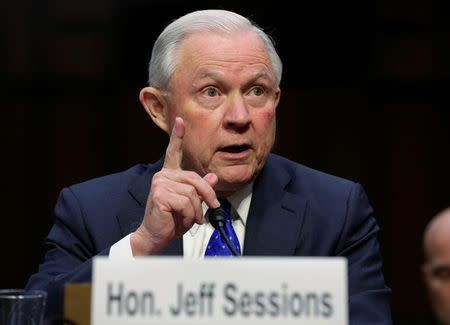Sessions refuses to discuss conversations with Trump on Russia

By Sarah N. Lynch and Lisa Lambert
WASHINGTON (Reuters) - U.S. Attorney General Jeff Sessions refused on Wednesday to answer lawmakers' questions about his discussions with President Donald Trump on Russia and denied lying to Congress about his own contacts with Russians during the 2016 election campaign.
In often testy exchanges with Senate Democrats, Sessions denied misleading them when he said during his Senate confirmation hearing earlier this year that he had not met with Russian officials during the campaign.
"I conducted no improper discussions with Russians at any time regarding the campaign," Sessions told the Senate Judiciary Committee.
Special Counsel Robert Mueller's investigation into Russia's alleged meddling in the election and possible collusion by Trump aides dominated the five-hour oversight hearing on Wednesday. Sessions also said Mueller has not interviewed him and sought to explain Trump's decision to fire the director of the Federal Bureau of Investigation in May, which the president has said was related to interference allegations.
A Republican former senator from Alabama and the top adviser to Trump's campaign on national security issues, Sessions had to recuse himself from investigations into alleged Russian interference after it was revealed in March that he met with Russian ambassador Sergei Kislyak at least twice in 2016.
The Washington Post reported in July that U.S. intelligence agencies picked up intercepts in which Kislyak told the Kremlin he had held substantive discussions with Sessions about Trump's positions on U.S.-Russia relations.
Sessions said on Wednesday he could not recall specific details of the conversation.
"I don’t think there was any discussions about the details of the campaign," he said. "It could have been that in that meeting in my office or at the convention ... some comments were made about what Trump’s positions were. I think that’s possible.”
Democratic Senator Patrick Leahy told Sessions many committee members believe the attorney general gave "false testimony" when he previously denied meeting with Russians.
Sessions countered that the question related only to matters specific to campaign interference, and told Leahy he had answered it truthfully. "I believe my answer was correct."
He also repeatedly said he was barred from discussing his confidential conversations with Trump. Those refusals could fuel Democrats' frustration with the administration over what they say is its inadequate cooperation with investigations into the Trump campaign's dealings with Russia.
Moscow has denied interfering in the election and Trump has said there was no collusion.
Trump drew sharp criticism when he fired former FBI Director James Comey in May and then said he considered the agency's Russia probe while making the decision.
Sessions said he and Deputy Attorney General Rod Rosenstein had recommended dismissing Comey over a different investigation into the use of a private server by Trump's election opponent, Democrat Hillary Clinton.
Comey overstepped his authority in announcing the Clinton investigation was concluded, Sessions said, and "that was a basis that called for a fresh start at the FBI."
He would not say whether his discussions with Trump about Comey touched on the Russia probe.
Earlier this year, Sessions' tenure as attorney general was in doubt as Trump repeatedly criticized him, especially for recusing himself from the Russia probe.
But Sessions adamantly defended the president on Wednesday, backing his controversial changes to immigration and policing programs as well as his ban on visitors travelling from several majority-Muslim countries.
(Reporting by Sarah N. Lynch and Lisa Lambert; Editing by Alistair Bell and Lisa Shumaker)

